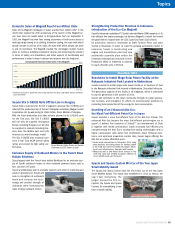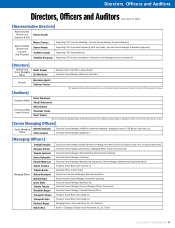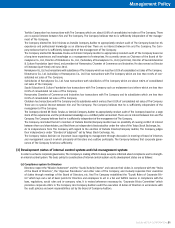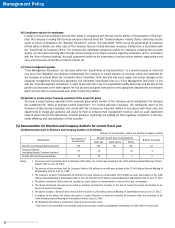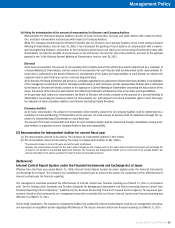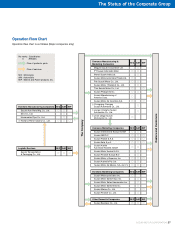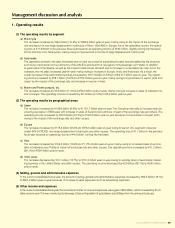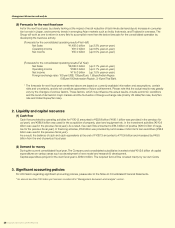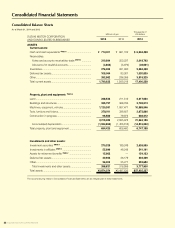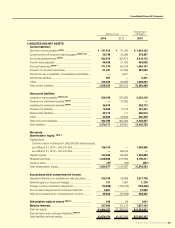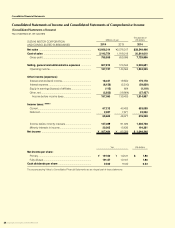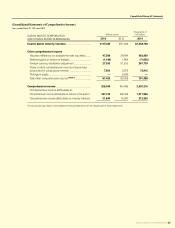Suzuki 2014 Annual Report Download - page 27
Download and view the complete annual report
Please find page 27 of the 2014 Suzuki annual report below. You can navigate through the pages in the report by either clicking on the pages listed below, or by using the keyword search tool below to find specific information within the annual report.
SUZUKI MOTOR CORPORATION 25
Risks in Operations
(4) Fluctuations of exchange rates and interest rates
We export motorcycles, automobiles, outboard motors and related parts to various countries in the world from Japan. In addition, we export
those products and parts from the overseas manufacturing plants to multiple other countries. Fluctuations of exchange rates may adversely
aect the performance and nancial conditions of The Group as well as our competitiveness.
Further, the exchange uctuations will aect the price setting of the products sold by The Company in foreign currencies as well as the
price of the raw materials purchased. The ratio of the overseas sales has reached about 60 percent of consolidated sales for the current
consolidated scal year, and transactions in foreign currencies account for signicant part. We take hedging measures such as forward ex-
change contracts to reduce the risks of exchange-rates and interest-rates uctuations, but it is impossible to hedge every risk, and the yen
appreciation against other currencies may adversely aect the performance and nancial conditions of The Group. On the contrary, the yen
depreciation may result in opportunity losses.
(5) Government regulations
Various legal regulations are applied to the motorcycle, automobile and outboard motor industries in relation to the emission level of emis-
sion gas, mileage, noises, safety and contaminated material emission level from the manufacturing plants. These regulations may be re-
vised, in many cases strengthened. Expenses to comply with these regulations may largely aect the performance of The Group.
In addition, many governments determine the imposition of taris, price control regulations and exchange control regulations. The Group
is paying expenses to comply with these regulations and will expect to continue bearing them. We may pay more expenses depending on
the establishment of new laws or changes of existing laws. Further, unexpected changes or new application of tax systems and economic
measures of each country may adversely aect the performance and nancial conditions of The Group.
(6) Quality assurance
We place the top priority on the product safety and make eorts to establish the quality assurance system from development to sales. We
buy insurance for the product liability, but there are risks not covered by insurance. The occurrence of large expenses for a large-scale re-
call to ensure safety of the customers may adversely aect the performance and nancial conditions of The Group.
(7) Alliance with other companies
We conduct various alliance activities with automobile manufacturer around the world and other companies such as for research and de-
velopment, manufacturing, sales and nance, but factors that cannot be controlled by The Group such as situations inherent to the alliance
partners may adversely aect the performance and nancial conditions of The Group.
(8) Legal proceedings
We may become a party to lawsuits and other legal proceedings in the course of our business activities. In the case where any judgments
disadvantageous to us are made in such legal proceedings, they may adversely aect the performance and nancial conditions of The Group.
(9) Inuences of natural disasters, wars, terrorism and strikes, etc.
The major manufacturing plants of The Group in Japan conduct manufacturing activities, located mainly in the Tokai region. In addition, the
head oce and other facilities of The Company are also concentrated in the Tokai region. Any occurrences of Tokai and Tonankai Earth-
quake may adversely aect the performance and nancial condition of The Group largely. We have taken various preventive measures such
as quake-resistant measures for buildings and facilities, re preventive measures, establishment of BCP (Business Continuity Plan), purchas-
es of earthquake insurances to minimize the inuences of damage by such disasters.
We also conduct businesses around the world and are subject to number of risks relating to our overseas operations. Such risks include polit-
ical or social instability and diculties, natural disasters, diseases, wars, terrorism and strikes. These unexpected events may delay or suspend
the purchase of raw materials and parts, manufacturing, sales of products, and provision of logistics and services. If such delay or suspension
caused by any of these factors occur or prolong, they may adversely aect the performance and nancial conditions of The Group.
Further, there are various risks other than those mentioned above, and what have been stated in this section do not represent all the risks
of The Group.


